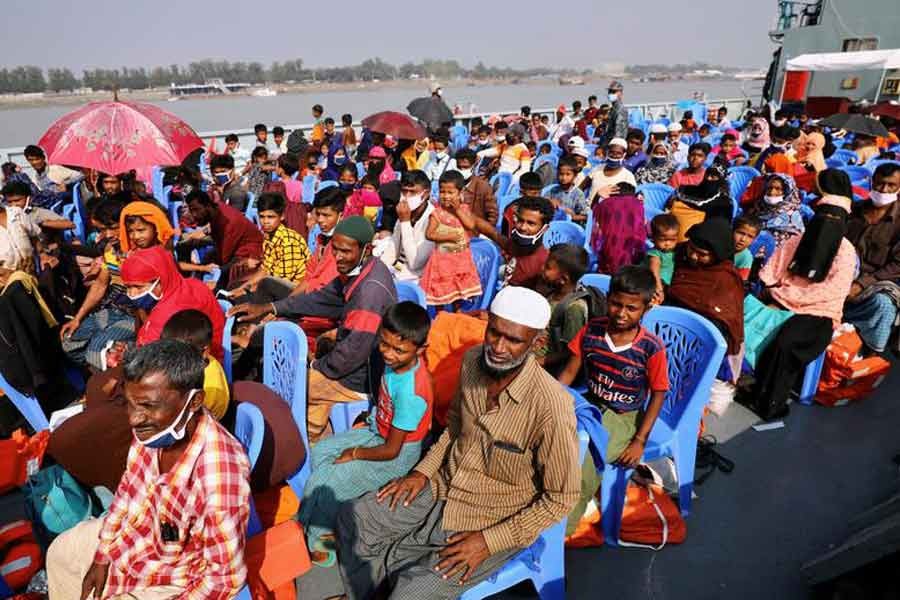Myanmar junta's honouring the xenophobic Buddhist monk Wirathuwith a national award recently and other developments in that country doesn't bode well, especially for the Rohingya refugees in Bangladesh. That this revered monk coulddenigrate himself to the extent of taking sides with the persecutors of the Rohingya Muslims may have seemed unconscionable to even his countrymen of conscience. The junta leaders' absolving the religious leader of the charges of instigation and felicitating him with a national award --- all this appears to be obliquely aimed at the Rohingya refugees in Bangladesh. As a result, the Rohingya Muslims in Bangladesh see slim chances of their peaceful repatriation. Whatever happens in Myanmar, the Myanmar-Bangladesh border and inside the Rohingya camps in Bangladesh, appear to be going against the refugees. Honouring Wirathu with state recognition is a mindless act; but this is plain truth.
Many blame all the Rohingya refugees for the unexpected turns they are made to face. But a dispassionate view weighs in. It points to both the Myanmar junta and the rebels spearheaded byARSA (Arakan Rohingya Salvation Army). Maybe there are other splinter groups advocating different agenda, misguiding the leaderless community. But ARSA appears to be calling the shots. This militant group has allegedly killed the Rohingya human rights activist, the Ukhiya-based Muhibullah, who emerged as a trusted Rohingya leader. While the ARSA militants were urging the common Rohigyas to stay back in the camps at Ukhiya and its neihbourhoods, Muhibullah vehemently opposed the appeal. He was vocally in favour of Rohingyas leaving Bangladesh, and starting life anew in Myanmar's Rakhine state. The ARSA`s opposition to Muhibullah was shrouded in mystery. Many in the Ukhiya-based Rohingya circles say the ARSA members were involved in drug smuggling, human trafficking and different types of anti-social activities. With its Rohingya haven gone, they will be nowhere. The Military government in Myanmar has long declared a war of sorts on the ARSA recruits, thanks to the latter's animosity with the junta soldiers deployed in the Bangladesh-Myanmar border areas. The rise of Muhibullah was meteoric. On being fed up with the threatening presence of the ARSA members and also with their dark future, the Rohingyas found a beacon of hope in the reassuring words of their trusted leader Muhibullah. Thus the killing of this leader dealt a severe blow to them. In place of the earlier homesickness and passivity among the Rohingya refugees, a mood of ill-placed vibrancy is seen overwhelming the refugee camps. Since they began arriving in Bangladesh in the second phase in 2017, the Rohingyas have never shown this restlessness which envelops them these days. The fallout of the Covid-19, especially the drop in relief goods supply and the restrictive measures has a role in the Rohingyas' disillusionment.
Since Muhibullah's killing in 2021, the gloom has kept intensifying by the day. The refugees pointed the finger at the ARSA for the blatant assassination. In retaliation, ARSA might start pouring its wrath on the sympathisers of the deceased leader. It's already a stifling atmosphere. Despite a good number of Rohingyas' resettlement on the remote Bay of Bengal Island called Bhashan Char, the greater segment manages a life in the Ukhiyaupazila under Cox's Bazar district. Their lifestyle have been changing fast since 7,42 000 of them entered Bangladesh in just a week in 2017 fleeing genocidal killings in their Rakhine villages in Myanmar. They came in droves, harried and panicked, frantically searching for a home. In a couple of months, the whole Ukhiya area was filled with makeshift dwellings. Trees in the locality were felled indiscriminately. With no proper sanitation, fears of waterborne diseases began looming. Thanks to the Bangladesh authorities' welcome gesture to the displaced Rohingyas, they gained the status of formal refugees. These Myanmar citizens in general are law-abiding and peaceful. But due to the density in their living arrangement in Bangladesh and many big and small problems, they began going out of the supervisory limits. As months and years wore on, the Rohingya youths were found clandestinely engaged in questionable activities. Groups of youths were reported to have gone to the Gulf countries as workers presenting themselves as Bangladeshis in their passports. Reports of involvement of a few racketeers in flesh trade and drug trafficking kept pouring in.
At present the unsettling news which is centred round the refugee community is its rising birth rate. In spite of relentless efforts in the form of advocacy and campaign, the situation doesn't improve. Given the trend continues for long, it might turn out to be a daunting task for Bangladesh to cope with the added burden of the population. In reality, the situation is unsavoury for both Bangladesh and the refugees. None of the sides have ever thought of these murky developments. Bangladesh is worried; and also tired of the ritualistic and diplomatic double-speak of the global and regional powers vis-à-vis the issue of the Rohingyas' return to their homeland. In short, the Rohingyas are feared to discover themselves soon that they have alreadygot tangled in a stifling situation. After the Covid-19 shock, the world is bracing for a time of new reality. Many critical episodes of the past years have been consigned to oblivion. For Bangladesh, it has somehow managed to overcome the great shocksthe corona fallout. But hectic times are staring it into the face. They belong to the economic and political areas.
In such confused times, the Rohingyas' uncertain travel abroad by sea aboard makeshift boats may not bring any desired result. For the boats cannot take them much further than the Aceh Province in Indonesia.


